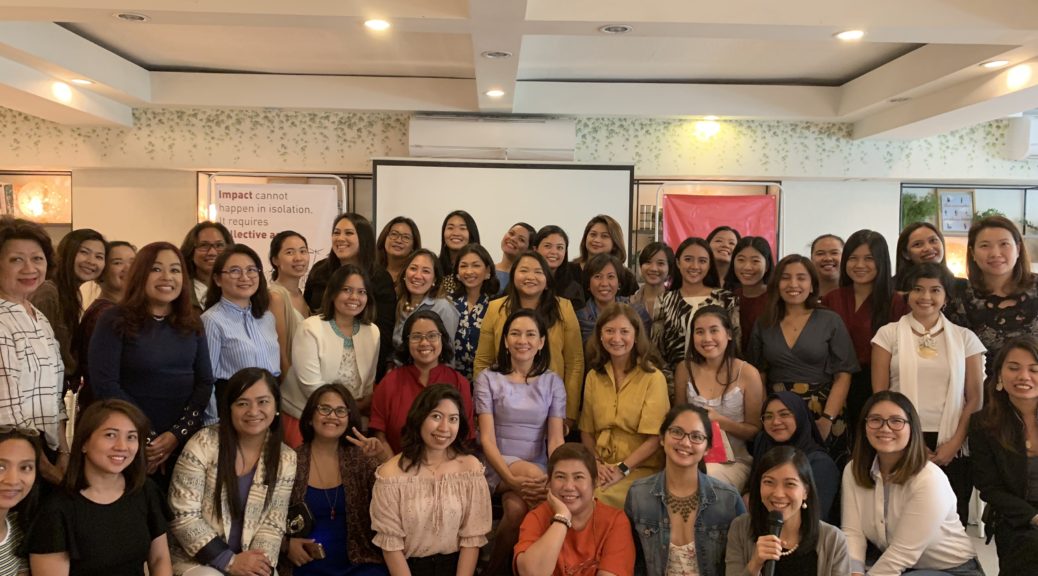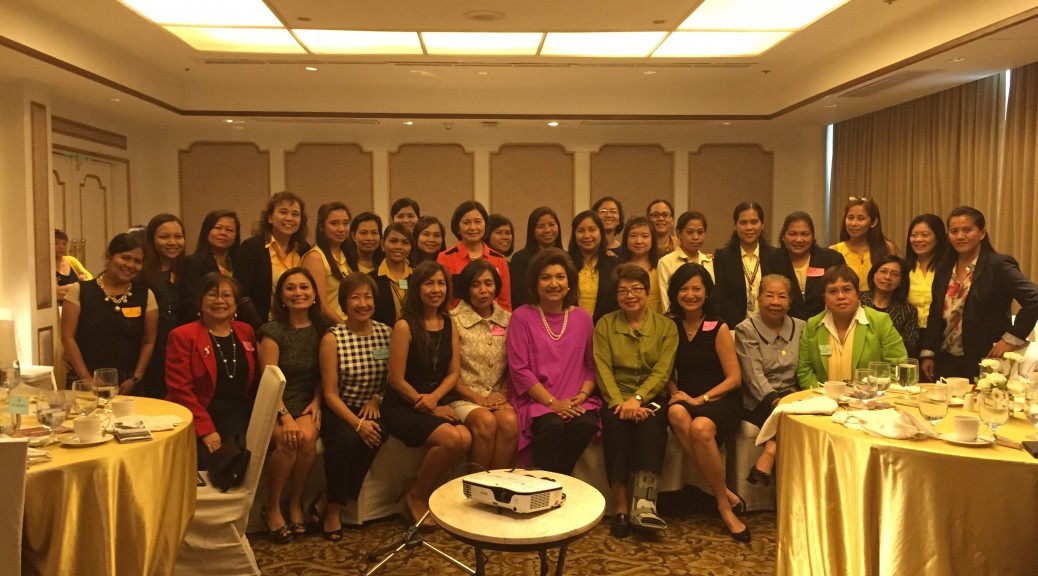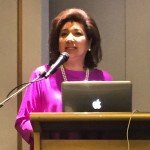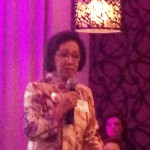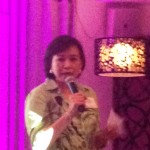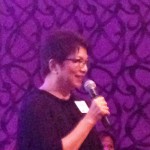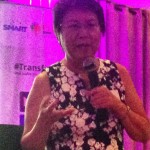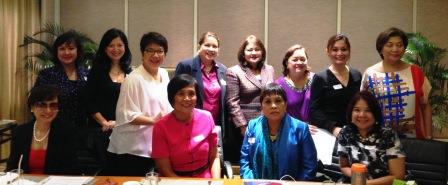(July 31, Manila) When my friend Ces Rondario, founder and CEO of Impact Hub Manila and Regional Lead for Impact Hub Asia Pacific, asked me to be a speaker at the July 31 Cartier Women’s Initiative: Female Founders Breakfast, I readily agreed, not knowing I was in a for a most enjoyable and meaningful experience.
On the way to the event, I googled who the other speaker was, and was pleasantly surprised to learn that Audrey Pe, founder and executive director of WiTech, short for Women in Tech, started her business at the tender age of 15. WiTech is a community organization that educates, inspires and empowers youth to break gender barriers and use technology to make positive differences in society. My curiosity was piqued and I looked forward to meeting Audrey.
Arriving at Happy Garden Café, I was ushered to the speakers’ table, where everyone seated there seemed younger than my children. I met Audrey, with her colleagues Marla Abao and Bing-Rong Hsieh of Launchgarage, and Carmina “Carbs” Bayombong of InvestEd. It was refreshing to meet such young women engaged in start-ups and serious about their craft. Soon, our keynote speaker, Republic of the Philippines Sen. Risa Hontiveros arrived, tipping the age balance slightly in my favor.
Our panel dealt with the issue of building an effective ecosystem for women entrepreneurs to thrive. Moderating our panel was Riva Galveztan, founder of Customized Dating, who I met years ago at another event, this time by the Business and Professional Women – Makati. Riva is another accomplished young woman, who has overcome odds and come out stronger and better. She is an entrepreneur and wellness advocate. Aside from running her company The Natural Shelf, which offers a variety of essential premium quality Filipino-made natural health products, Riva mentors students at the ABS-CBN Bayan Academy Grassroots Enterprise Management Program.
Sen. Risa, a staunch advocate for women’s rights, shared the importance of finding out and pursuing what you really want to do in life and what makes you happy. She talked about her early days as a student leader at St. Scholastica’s College which awakened her desire to help solve the country’s problems. She is behind the Safe Spaces Act that punishes catcalling, wolf whistling and online sexual harassment, among others. Before the event began, I congratulated her on getting this passed into law, and whispered my fervent wish that all our public officials, from top down, follow the Bawal Bastos Act.
Young, vibrant and driven, Audrey is a poster child for women in STEM (Science Technology Engineering and Math). While still in grade school, Audrey decided to learn coding by signing up for online courses and doing research. Realizing that very few women pursue tech and that there is a dearth in women role models in STEM, Audrey began a blog on inspiring women in technology. Her interviews and blog gained attention and soon some friends joined her. The WiTech community grew, and they organized the very first Women in Tech Conference (WiTCon) last year, a student-led conference for female students in tech. Together with WiTech members, she travelled to Marawi, a neglected area in the Southern Philippines that was bombed in 2017, to teach basic programming skills to teens living in evacuation centers. Audrey shared her dismay upon finding out the gender gap where women earned much less than men for doing the same kind of tech work and so she has decided to make eradicating this an advocacy. Clearly, Audrey is on the right path to helping empower women.
I, on the other hand, shared how I started TeamAsia in Hong Kong 27 years ago, organizing a management award program in six Asian countries, at a time when mobile phones and the Internet were still in their infancy stage. Proudly women-owned and women-led, TeamAsia is now an award-winning, strategic marketing communications firm that brings brands to the next level experience. I talked about the difficulties and choices I had to make as a wife, a mother, and as an entrepreneur, finding the right work-life balance while growing the company, and the need for women to have access to markets, access to finance, access to information, and access to a support system. For the latter, I said I could not have accomplished what I have without the support of my mother who took care of my children while I had to travel for work.
The event ended with a conversation between Ces Rondario and Carmina “Carbs” Bayombong. Carbs is president and CEO of InvestEd, an investment platform providing student loans to underserved youth using a proprietary credit rating algorithm. Coming from humble beginnings herself, Carbs came up with the idea of helping marginalized youth to achieve their dreams by providing student loans that cover tuition, miscellaneous fees, daily allowance, dorm and project expenses. Why, there is even a laptop loan! This is such a worthy social endeavor, and she proudly announced that her students have now started paying back their loans.
Carbs bested candidates from other countries to win the Cartier Women’s Initiative laureate for SouthAsia and Oceania in 2019. Only one other Filipina has won this award, and that is Jeannie Javelosa, who came in as Asia-Pacific finalist in 2012. A staunch advocate of culture, sustainability and gender, Jeannie is co-founder of the pioneering ECHOStore and the GREAT Women brand.
The Cartier Women’s Initiative, an international business programme, was created in 2006 by Cartier in partnership with INSEAD Business School to identify, support and encourage businesses led by women entrepreneurs (www.cartierwomensinitiative.com). Twenty-one women entrepreneurs, three finalists per region (Latin America & the Caribbean, North America, Europe, Sub-Saharan Africa, Middle East & North Africa, East Asia, South Asia & Oceania) are awarded every year. Seven laureates are chosen, one for each of the different regions.
As laureate, Carbs took home $100K in prize money which she is using for InvestEd, a scholarship to attend the six-day INSEAD Social Entrepreneurship Executive Education Programme in Switzerland, media visibility, and ongoing support for the further growth and development of their business. Carbs shared how all finalists received one-to-one personalized business and financial coaching prior to the Awards Week, attended a series of business coaching workshops and networking sessions during the Awards Week, enjoyed media visibility in the months leading up to the Awards Week, and were interviewed by local and international press during the Awards Week.
Many thanks, Ces and Impact Hub, for inviting me to the Cartier Women’s Initiative: Female Founders Breakfast, and for sending me this recap of the event: IMPACT_HUB_CARTIER_This was indeed time well-spent with the next generation of inspirational women leaders and entrepreneurs.
